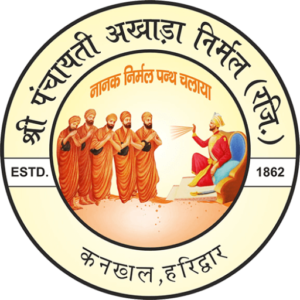History & Origins of Panchayati Akhara Nirmal
Exploring the Spiritual and Scholarly Legacy Rooted in Guru Gobind Singh Ji’s Vision :-
Introduction
The Panchayati Akhara Nirmal is more than just a spiritual institution—it is a living embodiment of India’s sacred traditions, where Sanatan Dharma and Nirmal Panth converge in harmony. Established in 1862 AD, this akhara traces its roots back to the vision of Guru Gobind Singh Ji, who laid the foundation of the Nirmala sect —a spiritual order dedicated to purity (Nirmal), knowledge, and dharma.
Today, Panchayati Akhara Nirmal stands proudly in Haridwar, but its historical journey began in Patiala, Punjab, with deep royal patronage and a profound mission: to protect, preserve, and propagate spiritual wisdom across India.
The Roots: Guru Gobind Singh Ji & the Birth of the Nirmala Sect
The origins of Nirmal Panth date back to the late 1600s when Guru Gobind Singh Ji, the tenth Sikh Guru, observed a need for spiritual scholars who could study and teach the ancient scriptures of India—particularly the Vedas, Upanishads, and Sanskrit texts.
He chose five devoted Sikhs and sent them to Varanasi (Kashi), the ancient city of learning, to master Sanatan knowledge. This group became known as the Nirmalas —ascetics who embodied purity, humility, and scriptural depth. This marked the beginning of the Nirmala tradition, blending Gurmat (Sikh thought) with the classical Indian wisdom found in Hindu philosophies.
Institutional Foundation in Patiala (1862 AD)
Centuries later, in 1862 AD, the Maharajas of Patiala offered land and support to formally institutionalize the Nirmala tradition. The Panchayati Akhara Nirmal was established with royal blessings, ensuring that the teachings of Nirmal Panth were carried forward with dignity, structure, and community support.
The word “Panchayati” refers to its governing council of saints, which continues to play a key role in spiritual leadership and management. The Akhara soon flourished as a center of scriptural learning, seva (selfless service), and ascetic discipline.
Philosophy of the Akhara
The core philosophy of Panchayati Akhara Nirmal is the synthesis of Sikh and Sanatan Dharma values:
* Study of scriptures: Deep exploration of the Guru Granth Sahib, Vedas, Bhagavad Gita, and Smritis.
* Spiritual purity: Focus on inner cleanliness, self-discipline, and brahmacharya.
* Inclusivity: Breaking caste boundaries through langar (community meals) and shared worship.
* Service & sacrifice: A life devoted to knowledge, teaching, and service to all.
These principles shaped the identity of Nirmala saints, who continue to wear saffron robes, keep unshorn hair, and uphold the 5 K’s of Sikhism with a calm, scholarly approach.
The Journey to Haridwar – Kankhal
As the Akhara grew, its spiritual magnetism led it to relocate its principal seat to Haridwar, on the banks of the sacred Bhagirathi-Ganga River, in Kankhal. Here, the Akhara became a key part of the Akhil Bharatiya Akhara Parishad, joining 12 other historic akharas in the spiritual heartland of India.
Haridwar offered not just sacred geography but also a powerful platform to serve pilgrims, host Kumbh Mela camps, and continue Vedic and Sikh traditions in an open, inclusive atmosphere.
Legacy & Relevance Today
Panchayati Akhara Nirmal continues to flourish with:
* Disciplined saints trained in scriptures, Sanskrit, Gurmukhi, and philosophy
* Centers across India spreading the message of Nirmal Panth
* Leadership under revered spiritual figures like Acharya Mahamandaleshwar Gyan Dev Singh Ji
* Participation in major spiritual events like Kumbh Mela
* Daily Ganga Pooja, pravachans, and brahmamuhurta path
In a world searching for balance, the Akhara remains a beacon of peace, discipline, knowledge, and unity.
Conclusion
The story of Panchayati Akhara Nirmal is not just about history—it is about continuity. It is about holding on to timeless values in a fast-changing world. From Patiala to Haridwar, from royal patronage to global recognition, the Akhara stands as a shining example of how spirituality, scholarship, and service can coexist in the purest form.
Whether you are a seeker, student, or devotee, the doors of Panchayati Akhara Nirmal are always open—to learn, to serve, and to evolve.
📞 Call to Action
✨ Visit us in Haridwar, experience the divine energy of Nirmal Akhara, or learn more at https://nirmalakhara.org

